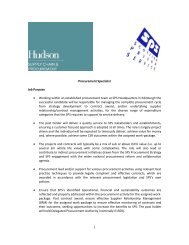Burnout Britain: Raising the Alarm for Employers - Hudson
Burnout Britain: Raising the Alarm for Employers - Hudson
Burnout Britain: Raising the Alarm for Employers - Hudson
Create successful ePaper yourself
Turn your PDF publications into a flip-book with our unique Google optimized e-Paper software.
<strong>Burnout</strong> <strong>Britain</strong>?<br />
<strong>Raising</strong> <strong>the</strong> <strong>Alarm</strong> <strong>for</strong> Employees.<br />
Employees Contd.<br />
3. Consider seeking support outside of your workplace.<br />
People that may be able to help include friends and family, your doctor or qualified<br />
occupational health professionals.<br />
4. Don’t just take time off from work.<br />
You may need a break, but <strong>the</strong> problems will still be <strong>the</strong>re when you return. Tackle<br />
<strong>the</strong> cause, ra<strong>the</strong>r than applying a temporary sticking plaster.<br />
5. Be clear about what is demanded from you.<br />
If feedback isn’t <strong>for</strong>thcoming, ask <strong>for</strong> it. Don’t wait until review time to discover<br />
what is expected of you.<br />
6. Suggest ways in which your role could be redesigned.<br />
All managers like to be presented with a solution, ra<strong>the</strong>r than a problem. Make a<br />
convincing case <strong>for</strong> how a reorganisation of your role could be beneficial to <strong>the</strong><br />
company.<br />
7. Give yourself designated times to check email.<br />
Make a concerted ef<strong>for</strong>t not to check emails as soon as you see that little envelope<br />
pop up on your screen. Look at emails every half hour or try to go <strong>for</strong> a whole<br />
hour! If it’s that urgent, someone will call you, ra<strong>the</strong>r than send an email. And if<br />
you’ve got a Blackberry, allow yourself to check it no more than once at <strong>the</strong><br />
weekend or evening.<br />
8. Talk to colleagues at your level.<br />
You cannot be <strong>the</strong> only one suffering in this way. Talk to colleagues and find out<br />
how <strong>the</strong>y are feeling. Approaching your boss in a group will make a greater impact.<br />
Or ask colleagues <strong>for</strong> advice on coping with pressure. Some people are better at it<br />
than o<strong>the</strong>rs, so learn from <strong>the</strong>m.<br />
9. Remember, what seems like a crisis now will be a distant memory tomorrow.<br />
Try to recall when you last took a day off work. Did problems arise while you were<br />
away? Yes? Try to delegate be<strong>for</strong>e you go away – and not just in <strong>the</strong> hour be<strong>for</strong>e<br />
you leave <strong>the</strong> office. Get into <strong>the</strong> habit of in<strong>for</strong>ming and including o<strong>the</strong>rs in your<br />
day-to-day work, and you will find <strong>the</strong>y are far more inclined and able to help out<br />
while you are not around.<br />
10. Get into <strong>the</strong> habit of leaving on time at least one night a week.<br />
Once you have left on time a few times, you will realise that <strong>the</strong> world does not stop<br />
without you. And <strong>the</strong>re is a great world out <strong>the</strong>re to be explored after five o’clock…
















